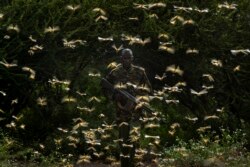As desert locusts spread across East Africa, Uganda has deployed its army to battle the all-consuming horde. The pests are laying countless eggs that are expected to hatch within weeks, raising concerns among farmers that the worst is yet to come.
Uganda is the latest East African country battling an invasion of millions of desert locusts after the pests this month crossed the Kenya border.
Thomas Onyango, a farmer in Oringo-Olyech village, woke one morning to find his garden being consumed.
“Half of the garden, there are no leaves on the cassava. When you check on the pigeon peas, all the leaves are gone, even the fruits that I was expecting to harvest, now they are all down on the ground," said the farmer.
Authorities say about 20 districts in northeast Uganda so far are affected.
To fight back, Uganda deployed 2,000 troops armed with pesticide.
But Major General Sam Kavuma, the spraying coordinator for the Uganda People’s Defense Force, said the locusts are skilled in evading their counterattacks.
“One challenge, which is being solved, that is aerial support to spray them, you know from air. Because, for us we deal much with those which are on the ground. And when we kill them, or during the spray, then they jump and go on top of the trees where our pumps cannot reach,” he said.
Ugandan authorities say they are working to secure helicopters for aerial spraying.
Meanwhile, the army is stretched as it chases the constantly moving swarms. Locals are left to their own devices to try to scare away the bugs, mostly by banging on pots and making noise.
Sarah Akello, a resident of Otuke, was one who gave the pests a chase.
“For me am fearing them. That locusts they are eating grass where I raise my animals, goat, cows and others,” said Akello.
Locust experts say if the swarms are not stopped, the eggs they are laying now will hatch within two weeks and the invading numbers will skyrocket. John Bahana is a locust expert with the Uganda Ministry of Agriculture.
“What it means is that if the eggs are laid and successfully hatch, then we are going into another generation and that generation will have multiplied up to four, five times the original population. So, it’s a huge increase. It’s an increase that can be frightening,” he said.
Experts say warm weather and heavy rains around the Red Sea Coast triggered massive locust breeding in Djibouti, Eritrea, and Sudan.
The pests have been devouring crops in Ethiopia, Kenya, Somalia, Tanzania, and Uganda in the worst swarms seen in decades.
If not brought under control, authorities say the desert locusts could soon threaten food security across the region.






